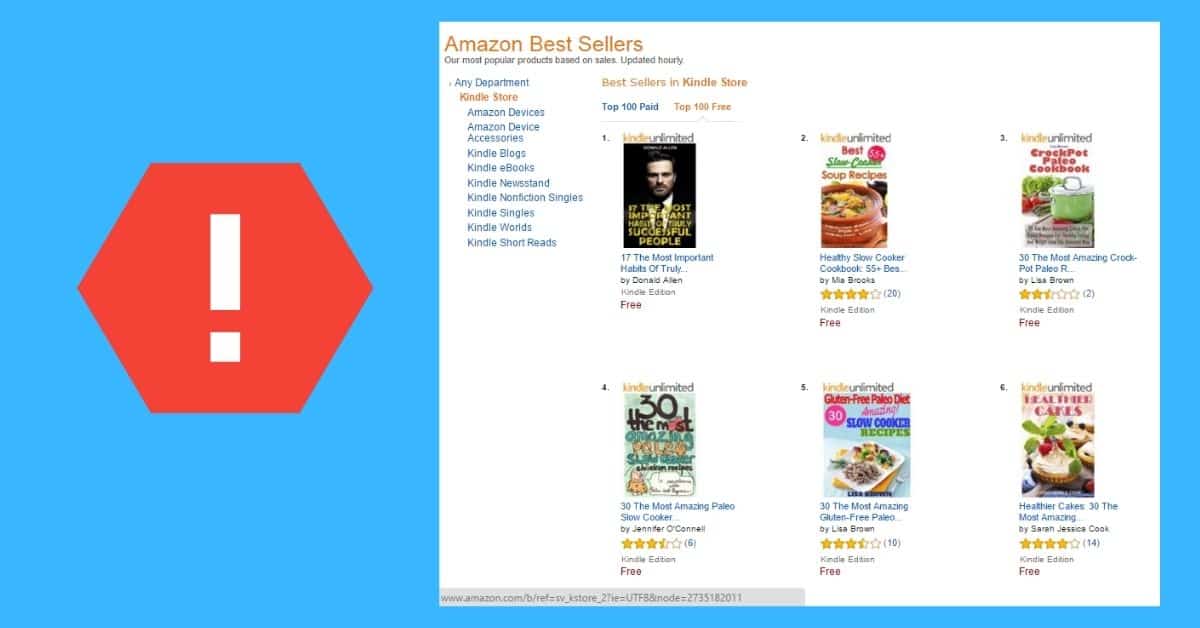Once again, scammers have swarmed the Amazon Best Seller list. It was only last month that Amazon was caught up in a crisis at least partly of its own making when bungled attempts to deal with a growing Kindle Unlimited scammer problem resulted in the sanctioning of innocent authors.
This post is from 15 April 2016. It has not been updated except to clean up broken links but the comments remain open.
Amazon has since apologized, and has also pledged to beef up its response to the KU scamming mess – but questions very much remain about whether Amazon is taking the problem seriously enough. A quick check shows that some of the main scammers are still operating, under the very same author names and book titles that were reported to Amazon in late February and early March. Which is very disappointing.
A couple of weeks ago, I was chatting with Phoenix Sullivan about the problem and she told me about something else she was witnessing – scammers taking over the free charts in the Kindle Store. I could see what she was describing and invited her to share the story here. But first, Phoenix wanted to give KDP an opportunity to take action.
You can guess how that went.
If you unfamiliar with Phoenix, she wears multiple hats: author, self-publisher, and publisher, as well as a very smart marketer and someone with a peerless understanding of Amazon’s systems and the various algorithms that power its recommendation engine.
KU Scammers Attack Amazon’s Free Ebook Charts by Phoenix Sullivan
Over the Easter weekend, I was watching a carefully orchestrated promotional campaign of Steel Magnolia Press titles. By design, we’re back down to just the original founders of the micropress—Jennifer Blake and myself, with a couple of pen names and about 75 titles between us. Our catalog is currently exclusive to Amazon, meaning we’re all-in in Select and KU. Our promotions are planned to optimize visibility via a mix of Free and Countdown Deals and keep our back and front list afloat for a few weeks, then rinse and repeat.
For our Easter weekend promotion, we had 12 books sharing an ad budget of about $1300. Of that, $365 was allocated to our anchor ad—a BookBub placement for a free box of 3 of Jennifer’s backlist romances. Things were trundling along as expected on Saturday, and the anchor title hit #2 on the freebie list late afternoon. So far, so good.
But a curious thing was happening further up the Top 100 Free list. Two other free books of ours seemed to be garnering enough downloads for ranks that would put them in the Top 100, but they were sitting just outside that visibility. In fact, during the early evening, one of those titles lost a rank. Yes, a single rank, but at #107 with a good history of increasing downloads behind it, that was very telling movement.
Additionally, we had another book in the Top 100 that seemed stalled in the #70s despite increasing downloads that day.
A peek at the full Top 100 Free list revealed why. There were 22 books across 7 author names on the list that didn’t belong. Yet there they were, hanging together as a block, solid from #6 to #27. I saw books of two friends that a couple of hours before had been in the Top 20—and most importantly, on Page 1—shoved back to the #30s and Page 2.
Let’s be clear. I run a lot of promotions. Steel Magnolia has been fortunate to have seen more than 30 titles in the Top 3 Free and another 70 or so titles hit in the Top 100, many of them multiple times. I’ve managed the giveaways of over 2.2 million copies. I watch this stuff. I pay attention to this stuff. I talk about this stuff. More power to the underdog books that come out of nowhere to grab a top spot on any list. We’ve had a couple of those ourselves. But even those underdog books have a very clear reason for being on the list. These 22 books under discussion, in my experienced opinion, not so much.
The majority of them were children’s picture books and cookbooks, with few to no reviews, keyword-stuffed titles (some with one or two misspelled words in the title), and blurbs that made it clear no English-speaking editor had touched them.
I’d seen this before periodically. A handful of freebies appearing high on the list out of nowhere, usually gone in 24-36 hours, most likely the result of click-farmed downloads. One such service was guinea-pigged and analyzed on KBoards, and users were subsequently admonished by Amazon and advised not to use them again.
During the free run periods I’ve managed, I’ve not seen them break through the BookBub wall—ranks #1 through #12 or so.
Until Easter weekend.
I went to sleep in the wee hours of Sunday morning—after firing off a letter to KDP Support—with our BB-backed freebie firmly ensconced at #2, only to wake up a few hours later to a front page of the Free list completely taken over, from #1 to #22, by those 22 books that didn’t belong.
Take a moment to absorb that. Our title was contemporary romance with a BookBub list of 2.2 million subscribers. That was the only promo site we bought for it, and it garnered about 25K downloads on the US site that day. The book ahead of Jennifer’s was a cozy mystery off a list of 3.3 million subscribers. Both were books by recognizable authors with a solid number of reviews. Yet 22 other books that day managed more than 25K downloads each. Plus the #1 book had zero reviews during the time it was at #1 and no author recognition factor.
That it happened over a weekend, especially a holiday weekend, was likely not a coincidence. Amazon Support is short-staffed on regular weekends, and they move slower to catch and correct.
Scammers Are Amazon’s Problem Too
Is it Amazon’s fault that scam services take advantage of their systems? No. But they do bear liability in putting systems in place and promoting them to their author-publisher clients, and then not policing those systems or changing them out in favor of something less-easily gamed.
I shop-talk algorithms a lot—ranks, poplists, recommendation algos, etc—and it’s easy to get caught up in the mathematics and theories, and to objectively dissociate their workings from their very real impact on our bottom line.
Your bottom line.
When those gamers steal visibility, they are stealing profits from others, pure and simple. The two books of ours in the Top 100 Free were impacted by the loss of visibility by being knocked back from Page 1 to Page 2 and from Page 5 to Page 7. The two books that hit just outside the list suffered even more from not getting deserved visibility. Not in some abstract, esoteric sense or bragging rights sense, but quantifiable dollars. Ethical authors and publishers are the ones having to pour more and more of our profits into the system to stay ahead of the scammers in terms of visibility.
But it doesn’t just impact us.
While Amazon seems to care little about the impact to KDP authors as a whole, they are undermining their own carefully built website infrastructure by allowing the gamers and scammers a place to flourish. They’re eroding the confidence of their customers every time a reader clicks in and is faced with a wall of low-quality scam books. That drives customers off-Amazon to find discoverability elsewhere. Which means fewer eyes browsing the paid ads on their site. Which means fewer impressions, fewer clicks, and fewer dollars—for Amazon.
If they won’t clean up their store because they feel it’s an author/self-publisher problem or a KDP problem, maybe they’ll care about cleaning it up when they realize it’s an Amazon problem too.
The correspondence I sent KDP Support was very detailed, leading off with the statement, “Please escalate this to management.” I also included the ASINs, authors and titles of all 22 suspect books. My escalation request made it up a notch, and I was assured, “My name is [removed], one of the Customer Service Supervisor with Kindle Direct Publishing. Your concern was transferred to me and I’ll be glad to help. [sic]” That short, personal part of the reply was followed by their lengthy, canned response about how ranks are determined, leading off with, “Thanks you for bringing this to our attention. Let me take an opportunity to explain you the way our sales ranking system works. [sic]” All of which was entirely irrelevant to the complaint at hand. And while I recognize it’s nothing more than a copy/pasted script triggered by keywords in my email, I also appreciate the irony of KDP Support lecturing me on how their rankings work.
The most frustrating part is being unable to reach someone who understands issues that aren’t in their scripts. Which is why I approached David about space to bullhorn these further shenanigans while he’s still on a roll with Amazon’s PR department over all the other gamers still playing Roulette with KU—and winning.
I want to be the vendor Amazon wants me to be—exclusive, smart about promoting, someone who drives legitimate traffic to their site, a money-maker for us and them, and a cheerleader for their services.
Why do they make it so hard?
And how many ethical authors are feeling pressured into adopting black hat techniques seeing how many black hatters are making bank on them with seeming impunity? Some days even I’m tempted to grab a few EINs and a handful of throwaway email accounts, put on a black hat and go to town. I understand the system—all I need is one good month to game it…
About Phoenix Sullivan
Phoenix Sullivan is not quite ready to trade her white hat for a black one. Currently, she’s Managing Director of Steel Magnolia Press (Jennifer Blake, President), still paying for advertising that reaches real readers who may or may not buy or download any of their books on offer depending on some factors under SMP’s control (covers, blurbs and content) and all those other ethereal ones that aren’t.
Final Note From Dave
My thanks to Phoenix for sharing her experiences. I wanted to highlight this story because it illustrates two aspects of this mess:
- What these scammers are doing isn’t particularly sophisticated but Amazon is still struggling to deal with the problem.
- Customer service levels at KDP are still unacceptable. Basic issues are generally handled well, it should be said, but when there is a serious or complex problem, KDP customer service can be awful. This has been an issue for years now and has never been properly addressed.
I also share Phoenix’s worry that authors who generally play by the rules may be tempted to start breaking them. I really hope that Amazon starts to get a handle on this, but its actions to date don’t inspire much confidence.
I don’t have access to Amazon’s internal systems, obviously, but with a few simple searches I can generate a huge list of both scammers and likely for-pay reviewers (and the authors and publishers using them). It’s really not too hard so I don’t know what Amazon is struggling with here. It’s quite obvious what the scammers are doing:
- Publish a title with keywords stuffed in the title so that it appears high in Search.
- Set it free so paid reviewers can download for free and add their paid-for reviews.
- Return it to the paid listings where it will appear even higher in Search now thanks to the free downloads.
These scammers are using a number of tricks to boost their Sales Rank, appearance in search, general visibility, and KU payouts:
- Title keyword stuffing. The most common trick involves inserting genre keywords in the book’s title, so instead of “Saved By The Big Bear” (an invented example) you will get something obnoxious like “ROMANCE: Shifter Romance – Saved By The Big Bear (Shifter Paranormal SEAL Cowboy Clean Romance)” as the book’s title. Then when a reader searches for “clean romance” or “paranormal romance” this title will appear.
- Page bloat. A common ruse is to upload 25 titles with different covers, but each containing all 25 books, with the order rotated slightly. Others fill the books with “translations” of the main title, or random content pulled from who-knows-where. This can turn a $1 KU payout into a $12 payout – from the common pool (i.e. your pocket).
- Click here tricks. Once the page count is bloated, then various inducements are given to readers to click to the end – whether that’s some kind of Table of Contents manipulation, telling the reader the “real” content is there, or offering them free books, or whatever.
- Category squatting. Titles are often added to a bunch of additional categories – often completely unrelated to the advertised content – for extra visibility.
- Cover impersonation. This one specifically relates to “study guides” which are often extremely short (i.e. 25-page) summaries of popular titles. Often the titles are designed to look like the original book and aren’t flagged as study guides. The scathing one-star reviews underneath show how many readers have been hoodwinked.
- Title impersonation. Often these study guides will insert the actual title of the book in the “Author” field so you will have a “study guide” for, say, Harper Lee’s debut and “To Kill A Mockingbird” entered as one of the authors. This hugely boosts appearance in search (try it and you will see what I mean – this one is not an invented example, and the author of that “book” is absolutely cleaning up right now).
- Author impersonation. This time they stuff a famous author’s name into the title of the book. Again, it boosts appearance in search and fools readers.
I can figure out all this with a little searching. Surely Amazon can do better. All of these wheezes already have specific policies forbidding these actions. Amazon doesn’t need to scramble to produce a new framework for handling these guys. It already has the rules in place.
It just needs to start applying them.


